People
John Mutua
John is a first-year PhD student. His main research interest centres on how spatial analysis and environmental modelling can contribute to decision making in agricultural systems. For his PhD, he will use earth observation (EO) combined with local ground truth data to estimate livestock feed composition in East Africa. These will then be used to support more robust estimates of Green House Gas (GHG) emissions from the livestock sector in East Africa. John is supervised by Dr. Gary Watmough from The University of Edinburgh’s School of Geosciences, Dr. Timothy Robinson from the Food and Agriculture Organisation of the United Nations (FAO) and Prof. Alan Duncan from the Royal (Dick) School of Veterinary Studies and the Global Academy of Agriculture and Food Security. Prior to his PhD, John worked as a geospatial analyst with the Alliance of Bioversity International and CIAT.
Twitter: JohnYumbya
_________________________________________________________________________________________________________________
Philipp Barthelme
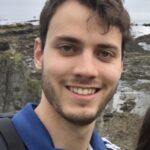 Philipp is a second year PhD student funded through the SENSE CDT in Edinburgh. Philipp jopined the group in October 2021 working on a project exploring the impact of humanitarian mine clearances on tropical forest carbon storage – Philipp is supervised by, Gary Watmough and Iain Woodhouse at UoE, Dominick Spraklen from Leeds Uni and Eoghan Darbyshire from CEOBS (The conflict and environment observatory) who are also the Case Partner for Phillip’s project.
Philipp is a second year PhD student funded through the SENSE CDT in Edinburgh. Philipp jopined the group in October 2021 working on a project exploring the impact of humanitarian mine clearances on tropical forest carbon storage – Philipp is supervised by, Gary Watmough and Iain Woodhouse at UoE, Dominick Spraklen from Leeds Uni and Eoghan Darbyshire from CEOBS (The conflict and environment observatory) who are also the Case Partner for Phillip’s project.
_________________________________________________________________________________________________________________
Saeeda Gouhari
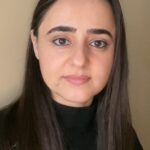 Saeeda is a first year PhD student with the E4 DTP in Edinburgh. Saeeda’s PhD research focuses on Monitoring, Evaluation and Learning of development initiatives using Earth Observation data and Artificial Intelligence. Her PhD involves looking at how EO data and AI could be used to plan scenarios for development projects, minimize risk and maximize socio-economic and environmental benefits and improve implementation of muti-purpose programmes for achieving sustainable development goals. Saeeda is supervised by Gary Watmough, Sohan Seth in Informatics, Alan Duncan in Global Academy of agriculture and food systems and she is part funded by the Jameel Observatory for Food Security Early Action.
Saeeda is a first year PhD student with the E4 DTP in Edinburgh. Saeeda’s PhD research focuses on Monitoring, Evaluation and Learning of development initiatives using Earth Observation data and Artificial Intelligence. Her PhD involves looking at how EO data and AI could be used to plan scenarios for development projects, minimize risk and maximize socio-economic and environmental benefits and improve implementation of muti-purpose programmes for achieving sustainable development goals. Saeeda is supervised by Gary Watmough, Sohan Seth in Informatics, Alan Duncan in Global Academy of agriculture and food systems and she is part funded by the Jameel Observatory for Food Security Early Action.
_________________________________________________
Reason Mlambo
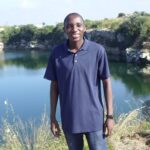 Reason is a first year PhD student with the SENSE CDT in Edinburgh. Reason’s PhD research focuses on Spatiotemporal poverty mapping using earth observation data and deep learning in Africa. Prior to joining the Geospatial Livelihoods Group Reason was a Lecturer in Midlands State University in Gweru, Zimbabwe as well as the
Reason is a first year PhD student with the SENSE CDT in Edinburgh. Reason’s PhD research focuses on Spatiotemporal poverty mapping using earth observation data and deep learning in Africa. Prior to joining the Geospatial Livelihoods Group Reason was a Lecturer in Midlands State University in Gweru, Zimbabwe as well as the
_________________________________________________
Seán Ó Héir
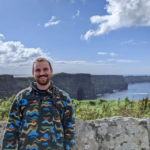 Seán is a first year PhD student with the SENSE CDT in Edburgh, based in the School of Informatics and primarily supervised by Dr. Sohan Seth but co-supervised by Gary. His research will focus on Explainable Population Estimation Using Deep Learning from Satellite Imagery.
Seán is a first year PhD student with the SENSE CDT in Edburgh, based in the School of Informatics and primarily supervised by Dr. Sohan Seth but co-supervised by Gary. His research will focus on Explainable Population Estimation Using Deep Learning from Satellite Imagery.
_________________________________________________
Sophia Klaußner
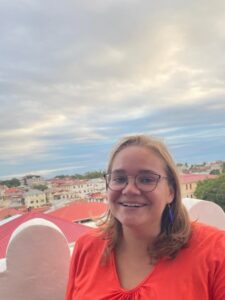
Sophia is a first-year PhD student at the University of Salzburg with the GEOHUM group. She is working on evaluating and quantifying biases in large scale EO derivatives to inform Humanitarian decision-making and foster livelihood understanding. Sophia is supervised by Stefan Lang (University of Salzburg) and Gary Watmough. Her work also aims to directly inform the work of her project partners at Médecins Sans Frontières (Doctors without borders).
_________________________________________________
Yashena Naidoo
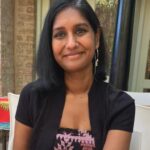 Yashena is a first-year PhD student. Her research focuses on modelling the spatial economy using satellite imagery and machine learning. She is interested in understanding the nuances of the spatial economy in Gauteng to uncover patterns of economic activity, inequalities, and urban development and to inform evidence-based policymaking. Her research seeks to leverage novel methods to fill in data gaps, enabling deeper insights into areas where traditional data sources are limited or unavailable. Yashena is supervised by Dr Gary Watmough (University of Edinburgh) and Dr Laven Naidoo (University of the Witwatersrand) as part of the Wits-Edinburgh Sustainable African Futures (WESAF) Doctoral Programme.
Yashena is a first-year PhD student. Her research focuses on modelling the spatial economy using satellite imagery and machine learning. She is interested in understanding the nuances of the spatial economy in Gauteng to uncover patterns of economic activity, inequalities, and urban development and to inform evidence-based policymaking. Her research seeks to leverage novel methods to fill in data gaps, enabling deeper insights into areas where traditional data sources are limited or unavailable. Yashena is supervised by Dr Gary Watmough (University of Edinburgh) and Dr Laven Naidoo (University of the Witwatersrand) as part of the Wits-Edinburgh Sustainable African Futures (WESAF) Doctoral Programme.
_________________________________________________
Past PhD Students
Peter K. Hargreaves
Peter submitted his PhD in September 2023 and is awaiting his viva examination. He was funded through the E4 DTP in Edinburgh. Peter’s research focused on the operational integration of satellite Earth observation into analysis of rural socioeconomic conditions. For his PhD, Peter used very-high spatial resolution satellite imagery and relating this to measures of poverty and wellbeing derived from a household panel dataset in southern Mozambique. The ultimate objective of this research was to improve the spatial and temporal monitoring capacity of socioeconomic conditions across rural spaces. In particular, to support reporting for the Sustainable Development Goals. Peter worked with the Ecosystem Services and Management Program at the International Institute for Applied systems Analysis (IIASA). Peter currently works as an International Development Consultant for NIRAS in Edinburgh
Sam Harrison
Sam submitted his PhD in 2023 researching the potential for using remote sensing as a tool to monitor ecological and social changes in agroforestry landscapes in the tropics, developing methods for mapping biodiversity, as well as exploring the links between remotely sensed farmland environmental metrics with poverty and community wellbeing. As part of his PhD he is working with the World Agroforestry Centre (ICRAF) to develop new metrics for monitoring trees on farms, to feed into the next generation of global biodiversity targets, which are currently being negotiated.
_________________________________________________
Affiliated Members
Surbhi Agarwal
 Surbhi is Postdoctoral Research Associate working on two Data For Children with UNICEF projects (1) GenVax project which aims to improve understanding regarding gender related barriers to immunization using large datasets and GIS systems and (2) the SEASNUT project for improving prediction of wasting prevalence making it comparable between countries and developing patterns overtime in the same country. Surbhi’s research interests include improving health equity, understanding the role of climate change and lifestyle choices on health outcomes for policy recommendations, food and nutritional security, and diabetes management using natural edible components to name the few. Surbhi is also interested in using routinely collected large datasets to understand health behaviors and outcomes.
Surbhi is Postdoctoral Research Associate working on two Data For Children with UNICEF projects (1) GenVax project which aims to improve understanding regarding gender related barriers to immunization using large datasets and GIS systems and (2) the SEASNUT project for improving prediction of wasting prevalence making it comparable between countries and developing patterns overtime in the same country. Surbhi’s research interests include improving health equity, understanding the role of climate change and lifestyle choices on health outcomes for policy recommendations, food and nutritional security, and diabetes management using natural edible components to name the few. Surbhi is also interested in using routinely collected large datasets to understand health behaviors and outcomes.
Surbhi has a Master’s degree in Public Health from Imperial College London and holds a Ph.D. degree in Food Nutrition from National Institute of Food Technology Entrepreneurship and Management which was funded by University Grants Commission and largely involved pre-clinical trials. Prior to that, Surbhi was trained in Human Nutrition through a Master’s degree in Food and Nutrition from University of Delhi.
_________________________________________________
Dr. Lesley Gibson
Dr. Charlotte Marcinko
 Charlotte is a research fellow within the School of Engineering at the University of Southampton. Her research interests lie in the integration of cross-disciplinary data to enhance our understanding of human-natural systems and provide effective information for policy makers. She is currently working on the ‘Opportunities and trade-offs between the SDGs for food, welfare and the environment in deltas (SDGΔ)’ project. This project works across scientific disciplines to understand the complex processes affecting the environment and rural populations living within the Indian Sundarbans. Charlotte’s research focuses on the analyses of an extensive array of environmental, biological, and socioeconomic data using a wide range of statistical and modelling methodologies. Charlotte and Gary have co-authored a forthcoming book chapter together ‘Towards achieving the UN’s Data Revolution: Combining Earth Observation and socioeconomic data for geographic targeting of resources for the Sustainable Development Goals’ which will be published in Dunn and Balapraksah (eds) Data Science Applied to Sustainability Analysis.
Charlotte is a research fellow within the School of Engineering at the University of Southampton. Her research interests lie in the integration of cross-disciplinary data to enhance our understanding of human-natural systems and provide effective information for policy makers. She is currently working on the ‘Opportunities and trade-offs between the SDGs for food, welfare and the environment in deltas (SDGΔ)’ project. This project works across scientific disciplines to understand the complex processes affecting the environment and rural populations living within the Indian Sundarbans. Charlotte’s research focuses on the analyses of an extensive array of environmental, biological, and socioeconomic data using a wide range of statistical and modelling methodologies. Charlotte and Gary have co-authored a forthcoming book chapter together ‘Towards achieving the UN’s Data Revolution: Combining Earth Observation and socioeconomic data for geographic targeting of resources for the Sustainable Development Goals’ which will be published in Dunn and Balapraksah (eds) Data Science Applied to Sustainability Analysis.
—————————————————————————————————————————————————————————————————————–
Past Members
Hollie Black
Hollie worked as a research intern in the summer of 2021 working on the SENSE funded Research Experience Placement (REP) internship programme. Hollie is a student going into her final year of studying a Masters in Mathematics and Statistics at the University of Strathclyde and is interested in pursuing a career in research. Hollie helped us to downscale the Children’s Climate Risk Index (CCRI) for Uganda and Tanzania.
Hannah Young
Hannah worked as a PDRA on the UNEP – STRATA project, developing a global mapping tool to monitor climate and environmental stresses, conflict and socio-economic vulnerability, in collaboration with UNEP and Earth Blox. Hannah was previously a postdoctoral scientist at the University of Reading, where her research spanned seasonal weather forecasting for East Africa, climate impacts on food security in Namibia, and the impacts of climate change on sweet potato production in Uganda. Prior to this, she completed her PhD at the University of Reading, investigating the role of attributing extreme weather events to climate change in national and international climate policy, focussing particularly on flood risk in Senegal. Hannah also has experience in the private sector, where as sustainability engineer for an agricultural technology company she worked with teams of software engineers and scientists to integrate understanding of sustainable agricultural practices in a decision-making tool.




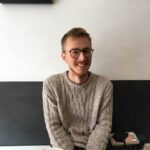
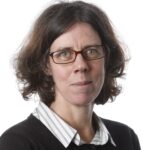


Comments are closed
Comments to this thread have been closed by the post author or by an administrator.